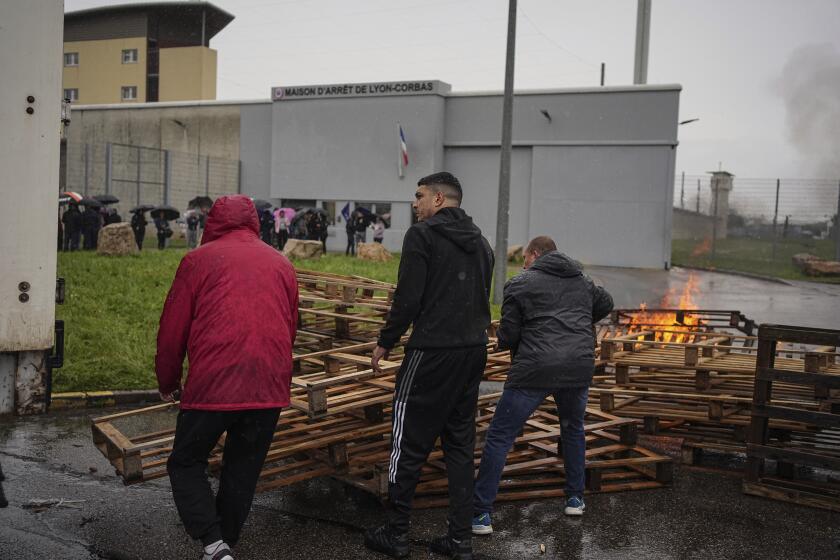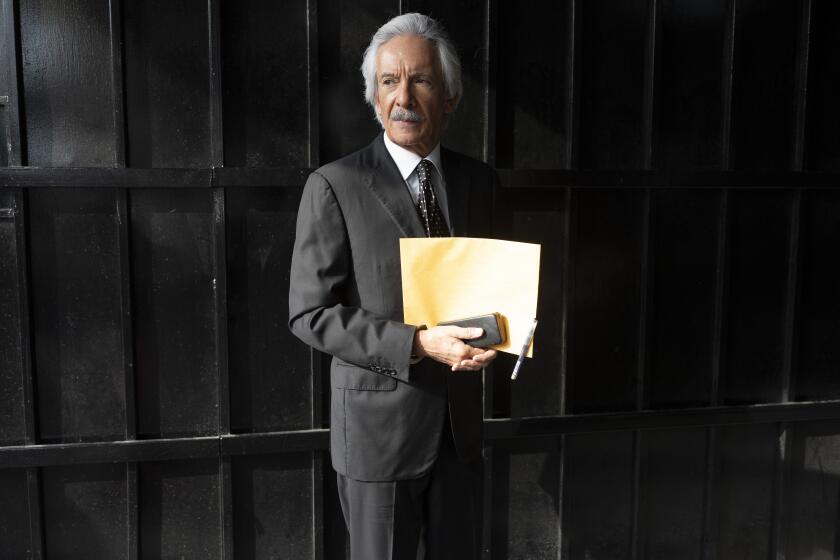He’s at the Front Lines Once Again
It is no trick to spot the warrior in Barry McCaffrey, even as the nation’s new drug czar meets reporters in his blue suit and black wingtips just after turning civilian for the first time since he was 17.
The quick giveaways are his close-cropped gray hair, GI bearing and West Point ring, class of ’64. Less obvious is a left arm decimated by machine-gun fire decades ago and rendered nearly useless, except for dexterity in his finger and thumb. North Vietnamese shrapnel is still lodged in his shoulder.
On his lapel is a tiny ribbon of colored steel: the Distinguished Service Cross with oak-leaf cluster, the nation’s second-highest valor award, twice won.
No matter where McCaffrey might be--even, as is the case today, at his formal swearing-in in the Roosevelt Room of the White House--the modest decoration is a siren of near-mindless heroism and headlong charges through the jungle erupting in unspeakable violence and bloodshed.
It is little wonder that a joint session of Congress rose to its feet applauding last month as President Clinton nominated the four-star general--then the most highly decorated army general on active duty and a hero of the Persian Gulf War--to lead the nation’s war on drugs, a conflict that has cost more American lives this half-decade alone than in all the Vietnam War.
“There is no reason to believe that the American people, with our enormous spiritual and moral strength, our respect for law, and our compassion for our children, cannot control the menace of drug abuse and the criminality it engenders,” McCaffrey, 53, said last week, dazzling a Senate Judiciary Committee that rushed his confirmation to the floor for approval.
McCaffrey, the nation’s fourth drug czar--after William J. Bennett, former Florida Gov. Bob Martinez and ex-New York Police Commissioner Lee P. Brown--arrives with a star-spangled resume.
The man who led the 24th Mechanized Infantry Division on a 200-mile desert slash in the famed “left hook” maneuver, cutting off and annihilating dozens of Iraqi divisions, McCaffrey is known for getting the job done.
“The worse thing that could happen to you was for him to be disappointed in you,” says U.S. Army Maj. Gen. John Van Alstyne, a former chief of staff for McCaffrey.
He is also said by insiders to be smart, savvy, charming, good with the press and to have a keen understanding of politics and public opinion. But at the same time, they say, he is headstrong, full of himself, relentless in pursuit of his own objectives and imbued--for better or for worse--with an innate sense that he is correct. Moreover, he can drive subordinates hard and sometimes into the ground.
They are assessments that the new drug czar concedes ring true.
A Massachusetts native and devout Catholic who drifts off to sleep at night listening to Italian light opera, McCaffrey says: “I am inner-directed. I normally figure out what the mission is and I go after it with ferocious concentration, and I don’t worry about other people’s lanes.”
The same certainty of purpose, tinged with an element of romance, has marked McCaffrey throughout his life. It was while listening to the rising strains of Ravel’s “Bolero” one snowy night as an Army brat studying at an elite private school that McCaffrey suddenly decided to abandon a future studying medicine for a career in the military.
And it was as a 19-year-old West Point cadet that McCaffrey proposed during a blind date to the woman who became his wife of 31 years, Jill Ann McCaffrey. She accepted four days later. Today they have three adult children and a first grandchild due in July. (Oldest son Sean was awarded a field promotion to captain while serving with the 82nd Airborne Division in Desert Storm; daughter Tara is a former Army nurse.)
Two years out of Vietnam, with the military struggling to become an all-volunteer force, it was a Maj. McCaffrey who riled superiors at West Point with a 30-page opus calling for expanding the role of women in the Army. They refused to publish it.
And it was a Gen. McCaffrey who unveiled his Iraqi battle plan to his officers as a Christmas Eve gift and told then-Defense Secretary Dick Cheney, in a briefing before other division commanders, that nothing worried him about defeating the Iraqis.
“We’re fully modernized. Our soldiers are the best in the world,” McCaffrey said, according to an account by James Kitfield in his book “Prodigal Soldiers” (Simon & Schuster, 1995).
*
McCaffrey was awarded the Distinguished Service Medal for his leadership in Desert Storm. In his division’s race across the desert--which was completed 15 hours ahead of schedule with McCaffrey tracking progress in a Bradley Fighting Vehicle--only eight soldiers were killed.
There were always those elements of idealism and esprit de corps to McCaffrey’s military service. His favorite movies of all time are “The Bridge on the River Kwai” and “Glory.”
It was as an advisor to an elite unit of South Vietnamese paratroopers and later as a company commander in the 7th Cavalry that McCaffrey would win two Distinguished Service Crosses, two Silver Star medals and three Bronze Stars, and three times be awarded the Purple Heart for wounds received in battle. His heroism often took the shape of his single-handedly charging enemy bunkers or leading men in the face of gunfire to overrun enemy positions, at times while he was grievously wounded.
He once described in writing the incentive that led him and other young American officers to act as advisors: “a touch of the romantic, an ear for the soldier poetry of Rudyard Kipling and a sense of adventure which led them to volunteer to live and fight with a foreign unit of shock troops.”
Pressed on the source of courage, McCaffrey is reticent: “You do what you have to do.”
His romantic vision of conflict outlasted even the nightmares of Vietnam, so terrible that when Jill McCaffrey learned that her husband was coming home crippled, but alive, she burned his letters to erase the memory of that war.
“I think Jill did destroy those letters in an absolute rejection of what for her turned into a real horror scene,” McCaffrey says. He had hoped create a diary out of them as legacy of his experiences.
In Kitfield’s book, which examines that generation of Vietnam officers who helped refashion the American military, the author describes McCaffrey as a Kennedy liberal. And while McCaffrey says now that he is uncomfortable with labels and not registered with either political party, he admits to being an unabashed admirer of the young president and his social agenda.
It was what drove McCaffrey to promote equal opportunity for women in the Army. He has preached long and hard against human rights abuses by the military and once described Gen. William Tecumseh Sherman’s march through Georgia during the Civil War as “barbarity” that was as ruthless as the Nazi invasion of Russia during World War II.
In 1991, for his efforts to improve race relations while commander of the 24th Infantry at Ft. Stewart, Ga., he was awarded the Roy Wilkins Renown Service Award by the NAACP, of which McCaffrey is a member.
“He never hesitates to let anyone know that he is a recipient,” says Command Sgt. Maj. Franklin Delano Thomas, who was McCaffrey’s senior enlisted officer in his last military assignment as head of U.S. Southern Command, which comprises all of the Western Hemisphere south of Mexico.
It was in this assignment that McCaffrey further burnished his reputation by aggressively organizing Army and other agencies in interdicting the South American drug trade. Here again, he stepped on toes to pull resources together under his command. With the use of radar-tracking aircraft, McCaffrey’s efforts have created major disruption of the so-called air bridge that traffickers had built using small- and medium-size airplanes to carry drugs from Peru and Bolivia to Colombia, officials say.
“We’re forcing the traffickers to react to us,” says Brian Sheridan, deputy assistant secretary of defense for drug enforcement policy and support, who has worked extensively with McCaffrey.
The new drug czar, who some thought might be destined one day for Chief of Staff of the Army or even chairman of the Joint Chiefs of Staff if he stayed in the service, accepted Clinton’s nomination after discussions with one of his closest advisors: his 81-year-old father, retired three-star Gen. William McCaffrey, who urged him to take it.
Some critics worried that McCaffrey--who must coordinate the resources of 50 federal agencies--might place emphasis on enforcement over prevention. But even here the retired general seems inclined to break ranks with convention. Punishing drug offenders is vital, but drug education for children is the No. 1 priority, he says.
“The solution to our drug problem is not in incarceration,” McCaffrey says.
Times staff writer Art Pine contributed to this report.
More to Read
Start your day right
Sign up for Essential California for news, features and recommendations from the L.A. Times and beyond in your inbox six days a week.
You may occasionally receive promotional content from the Los Angeles Times.






